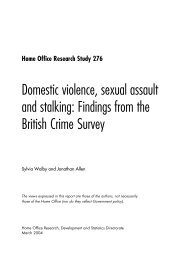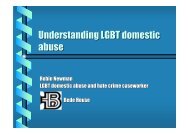1 Domestic violence information
Theory and Practice for the Substance Misuse Sector (pdf - AVA
Theory and Practice for the Substance Misuse Sector (pdf - AVA
You also want an ePaper? Increase the reach of your titles
YUMPU automatically turns print PDFs into web optimized ePapers that Google loves.
As a drug/alcohol worker you will already complete a lengthy risk<br />
assessment form. As standard you should include a question about<br />
experiences of <strong>violence</strong>. If your service user is indicating experiencing<br />
<strong>violence</strong> or abuse from a partner or family member you should ask<br />
further questions:<br />
• “Is the <strong>violence</strong> worsening in nature?”<br />
• “Has your partner been more controlling lately and/or<br />
attempted to isolate you?“<br />
• “Do you feel unsafe to go home?”<br />
• “Are you planning to leave your partner or recently separated?”<br />
• “Has your partner attempted to choke or strangle you?”<br />
(a high proportion of women who are murdered are strangled<br />
by their partners)<br />
• “Has a weapon been used against you? E.g. a household<br />
instrument used as a weapon”<br />
• “Has <strong>violence</strong> occurred whilst you were pregnant?”<br />
• “Have you been forced to have sex or perform a sexual act<br />
against your will?”<br />
• “Have children been injured during a domestic<br />
<strong>violence</strong> incident?”<br />
• “Does your partner force you to use drugs/alcohol?”<br />
Answering yes to any of these questions could mean your service<br />
user is at a high level of risk. It is important that you work with a<br />
domestic <strong>violence</strong> professional to complete a thorough risk<br />
assessment as soon as possible. If your service user does not wish to<br />
speak to a domestic <strong>violence</strong> worker you should respect these choices<br />
and not force this option. However, you should consider undertaking a<br />
full risk assessment to determine whether you should refer and share<br />
<strong>information</strong> to your local MARAC (see pg 130).<br />
<strong>Domestic</strong> <strong>violence</strong> cases can be highly complex with fragmented<br />
<strong>information</strong> shared across several different services. Joint <strong>information</strong><br />
sharing and development of a risk management strategy is far more<br />
effective and prevents you as a lone worker or agency carrying the<br />
sole responsibility for victim/survivor (and their children’s) safety.<br />
Remember:<br />
Risk assessments are not foolproof and they only give an indication<br />
of risk at that particular point in time. Victim/survivor assessment of<br />
danger is the most reliable indicator of risk. 17<br />
If she feels he will be<br />
violent again, chances are that he will. 18<br />
Nevertheless, you should be aware that women often minimise the risk<br />
as a way of coping so a denial / hope that he will not be violent again<br />
is not as reliable. Other research suggests that assaults committed<br />
whilst intoxicated are also a relatively reliable indicator of future risk of<br />
serious <strong>violence</strong>.<br />
An example of a risk assessment can be found on pg 282.<br />
High Risk Cases - when should I override requests for<br />
confidentiality?<br />
Upon initial assessment it is standard practice to explain the limits<br />
of confidentiality. <strong>Domestic</strong> <strong>violence</strong> comes under the duty to share<br />
<strong>information</strong> if a service user is deemed a risk to themselves or others.<br />
If you determine your service user to be at a high level of risk then<br />
you are obligated to override confidentiality and share <strong>information</strong><br />
with a domestic <strong>violence</strong> professional without consent. If you are<br />
concerned for your service user’s immediate safety upon leaving<br />
your service you should call the police.<br />
If having undertaken a risk assessment you deem your service user<br />
to be at a high level of risk you should refer to your local MARAC<br />
coordinator and be prepared to share <strong>information</strong> on a need to<br />
know basis. It is best practice to tell your service user this is what<br />
you are doing whether you have obtained their consent or not.<br />
128<br />
© Stella Project Section 3 - <strong>Domestic</strong> Violence<br />
© Stella Project Section 3 - <strong>Domestic</strong> Violence 129












